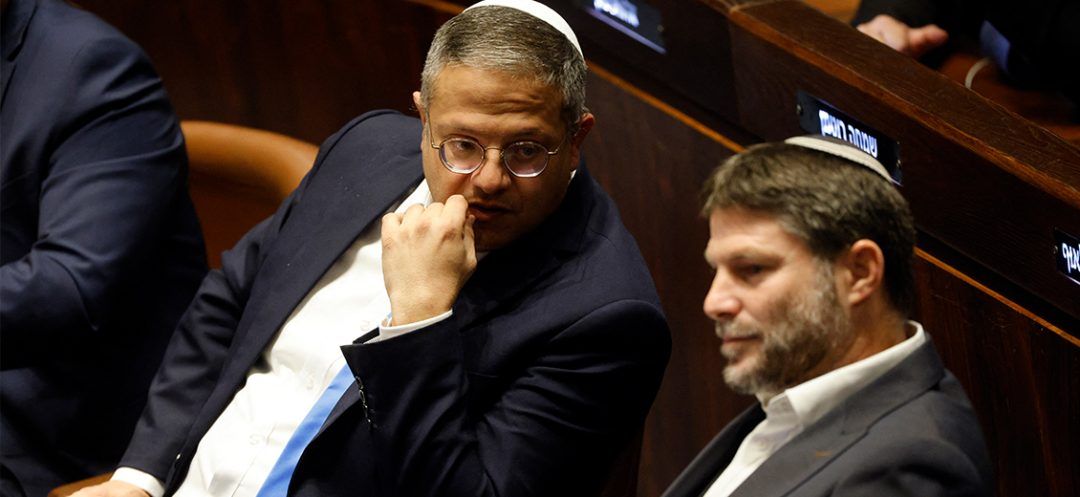
©(Photo by AMIR COHEN / POOL / AFP)
Three ministers from Israeli Prime Minister Benjamin Netanyahu's governing coalition on Thursday rejected a US-led proposal for a Lebanon ceasefire and demanded that the fight against Hezbollah go on.
The United States and allies issued a joint call for a 21-day halt in fighting in Lebanon after Israeli air strikes on Iran-backed Hezbollah killed hundreds and displaced tens of thousands in Lebanon this week.
The appeal for the three-week ceasefire came hours after Israel's military chief, Lieutenant General Herzi Halevi, told soldiers Wednesday to prepare for a possible ground offensive against Hezbollah.
Israel's far-right Finance Minister Bezalel Smotrich, a key member of the cabinet, opposed the ceasefire proposal, insisting that continuing the war against Hezbollah was the only way forward.
"The campaign in the north should end with a single result: crushing Hezbollah and elimination of its ability to harm the residents of the north," Smotrich said on social media platform X.
"The enemy must not be given time to recover from the heavy blows it has suffered and reorganize itself to continue the war after 21 days," he said.
"Hezbollah's surrender or war—this is the only way to bring back the residents and security to the north and the country."
Far-right National Security Minister Itamar Ben Gvir threatened to boycott cabinet activities if the government agreed to a temporary ceasefire and to resign altogether if a ceasefire became permanent.
"The most basic and obvious thing is that when your enemy is on its knees, you don't allow them to recover, but rather you act to defeat and overthrow them," Ben Gvir said, according to a party statement.
"If you don't do that, you project weakness, endanger the security of your citizens, and prove that you have no intention of winning."
Ben Gvir and Smotrich have also been strong advocates of continuing the war in Gaza, where Israeli forces have been battling Palestinian militants since October 7.
Netanyahu's coalition relies on their support.
'Continue to Fight'
In a separate statement on X, Foreign Minister Israel Katz also opposed any halt to fighting against Hezbollah.
"There will be no ceasefire in the north. We will continue to fight against the Hezbollah terrorist organization with all our strength until victory and the safe return of the residents of the north to their homes," Katz said, referring to tens of thousands who have been displaced by nearly a year of cross-border clashes that escalated this week.
Israel's main opposition leader, Yair Lapid, said the Israeli government should agree to a ceasefire, but only for seven days.
This would "prevent Hezbollah from restoring its command and control systems," Lapid said on X.
"We will not accept any proposal that does not include the withdrawal of Hezbollah from our northern border."
With AFP
The United States and allies issued a joint call for a 21-day halt in fighting in Lebanon after Israeli air strikes on Iran-backed Hezbollah killed hundreds and displaced tens of thousands in Lebanon this week.
The appeal for the three-week ceasefire came hours after Israel's military chief, Lieutenant General Herzi Halevi, told soldiers Wednesday to prepare for a possible ground offensive against Hezbollah.
Israel's far-right Finance Minister Bezalel Smotrich, a key member of the cabinet, opposed the ceasefire proposal, insisting that continuing the war against Hezbollah was the only way forward.
"The campaign in the north should end with a single result: crushing Hezbollah and elimination of its ability to harm the residents of the north," Smotrich said on social media platform X.
"The enemy must not be given time to recover from the heavy blows it has suffered and reorganize itself to continue the war after 21 days," he said.
"Hezbollah's surrender or war—this is the only way to bring back the residents and security to the north and the country."
Far-right National Security Minister Itamar Ben Gvir threatened to boycott cabinet activities if the government agreed to a temporary ceasefire and to resign altogether if a ceasefire became permanent.
"The most basic and obvious thing is that when your enemy is on its knees, you don't allow them to recover, but rather you act to defeat and overthrow them," Ben Gvir said, according to a party statement.
"If you don't do that, you project weakness, endanger the security of your citizens, and prove that you have no intention of winning."
Ben Gvir and Smotrich have also been strong advocates of continuing the war in Gaza, where Israeli forces have been battling Palestinian militants since October 7.
Netanyahu's coalition relies on their support.
'Continue to Fight'
In a separate statement on X, Foreign Minister Israel Katz also opposed any halt to fighting against Hezbollah.
"There will be no ceasefire in the north. We will continue to fight against the Hezbollah terrorist organization with all our strength until victory and the safe return of the residents of the north to their homes," Katz said, referring to tens of thousands who have been displaced by nearly a year of cross-border clashes that escalated this week.
Israel's main opposition leader, Yair Lapid, said the Israeli government should agree to a ceasefire, but only for seven days.
This would "prevent Hezbollah from restoring its command and control systems," Lapid said on X.
"We will not accept any proposal that does not include the withdrawal of Hezbollah from our northern border."
With AFP
Read more



Comments